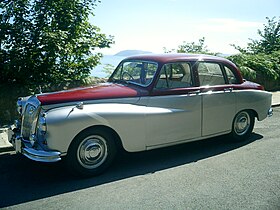Daimler Majestic
| Daimler Majestic DF316 | |
|---|---|
 |
|
| Overview | |
| Manufacturer | The Daimler Company Limited |
| Production |
|
| Body and chassis | |
| Class | Luxury |
| Body style | Four-door Saloon |
| Related |
|
| Powertrain | |
| Engine | 3.8-litre in-line 6 |
| Transmission | Borg-Warner Automatic |
| Dimensions | |
| Wheelbase | 114 in (2,900 mm) |
| Length | 196 in (5,000 mm) |
| Width | 70.5 in (1,790 mm) |
| Height | 63 in (1,600 mm) |
| Kerb weight | 35 long hundredweight (3,900 lb; 1,800 kg) |
| Chronology | |
| Predecessor | Daimler One-O-Four DF310 |
| Successor | Daimler Sovereign |
| DF316 3.8-litre engine | |
|---|---|
| Overview | |
| Manufacturer | The Daimler Company Limited |
| Combustion chamber | |
| Configuration | 6-cylinder in-line |
| Displacement | 3,794 cc (231.5 cu in) |
| Cylinder bore | 86.4 mm (3.40 in) |
| Piston stroke | 107.95 mm (4.250 in) |
| Cylinder block alloy | cast iron |
| Cylinder head alloy |
|
| Valvetrain | OHV pushrod cam-in-block |
| Compression ratio | 7.5:1 |
| Combustion | |
| Fuel system | twin S.U. HD6 carburettors, alloy manifold with water-heated jackets |
| Fuel type | petrol supplied by AC mechanical pump |
| Oil system | submerged gear type pump, Tecalemit full-flow oil filter with safety by-pass |
| Cooling system | water, pump and fan, thermostatically controlled |
| Output | |
| Power output | 147 bhp (110 kW; 149 PS) @4,400 rpm |
| Torque output | 209 lb·ft (283 N·m) @ 2,800 rpm |
The Daimler Majestic DF316/7, DF318/9 luxury saloon was launched by the Daimler Company of Coventry in July 1958 and was in production until 1962. Edward Turner had been appointed Chief Executive of BSA Automotive in 1957 and promised new products, this car was to carry his new V8 engine still under development. The six-cylinder, four-door saloon, with new three-speed Borg Warner automatic transmission, power steering and vacuum-servo assisted four-wheel disc brakes was mechanically up-to-date for its time, but it had a heavy coachbuilt body of outdated construction on a separate chassis which kept the car's mass well above more modern designs and made it difficult to manoeuvre, despite the modern steering. The styling was already becoming outdated when the car appeared and became increasingly dated as lighter cars with monocoque construction appeared during the Majestic's production run.
A minor evolution of the preceding Regency the Majestic, like all new Daimlers following 1937's New Fifteen, was designed around that same massive cruciform-braced box-section chassis equipped with André Girling's design of coil-sprung independent front suspension with a well-located hypoid bevel driven 'live' rear axle using semi-elliptic springs.
The Majestic's four-wheel Lockheed-servo-assisted Dunlop disc brakes were regarded as a first for a British production car. It was the first saloon car without any claim to a sportscar nature to be equipped with disc brakes. An emergency or handbrake was provided by fitting special pads to the rear brake discs which were operated by cables and rods.
The engine, slightly larger than the Regency's, was an inline six of 3.8 litres (3794 cc), based on previous Daimler sixes with pushrod operated overhead valves and retaining the 107.95 millimetres (4.25 in) stroke, but with the bore increased to 86.36 millimetres (3.4 in) from the 82.55 millimetres (3.3 in) of the One-O-Four, giving a power output of over 147 brake horsepower (110 kW) at 4,400 rpm and produced 209 lb·ft (283 N·m) of torque at 2,800 rpm. The Majestic had a maximum speed of around 180 km/h (112 mph) but see Performance below. To help with the increase in the bore, the cylinder block was considerably enlarged to allow for the fitting of completely new liners: dry liners as present on the One-O-Four were absent on the Majestic. The Borg-Warner transmission required repositioning of the starter motor and consequent modifications to the crankcase and cylinder block castings. The crankshaft has four main bearings, integral balance weights and a torsional vibration damper mounted at the front.
...
Wikipedia
